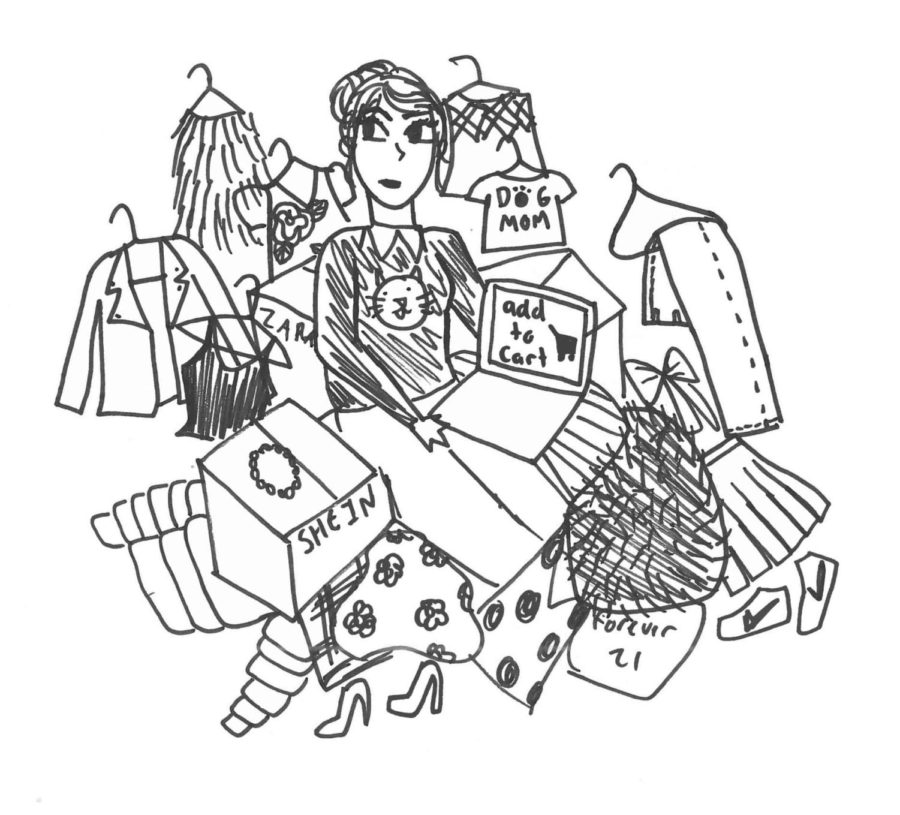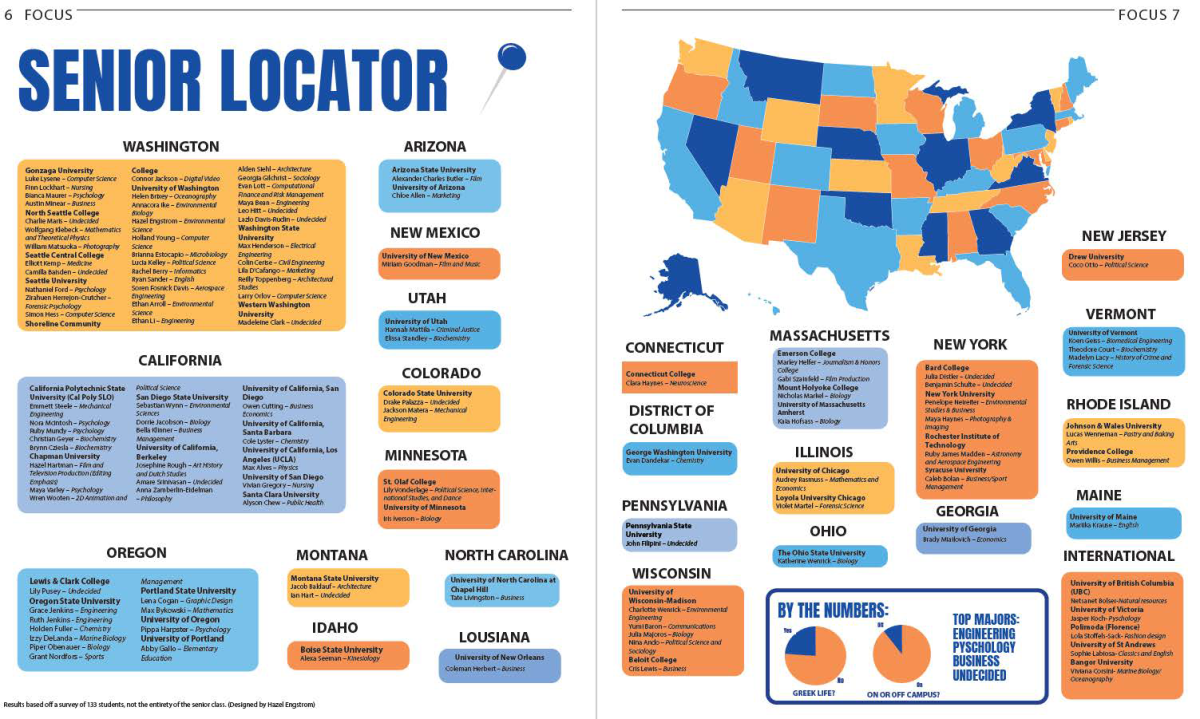The death of mall culture and the future of ethical consumption
(or why does everything at Macy’s look like it’s from 2018)
In a culture where self care and spending are near synonyms, consumption becomes a replacement for hobbies, introspection, and true fulfillment.
March 16, 2023
In my quest to find a dress for winter ball, I shopped for nine hours and visited 11 stores, and came back empty handed, with nothing but a couple dollars missing from my wallet and stomach ache from the overpriced cheese sauce of my Wetzel’s Pretzels.
I wasn’t alone in my disappointment, it was palpable in the air. The mall was crowded, full of people rushing around without getting anywhere. No one looked satisfied. No one looked happy. We were all wilting, sagging to the side like the faux flowers in the store display cases.
We’d been there for hours, carefully sifting through dresses and ties, but to no avail. Everything looked cheap, tacky jewels on plasticky dresses, only to reveal the garments in question were upwards of $80. I might be cheap, I honestly lost sight of what a reasonable price is, but I don’t think anyone should pay that much for something that’s falling apart on the rack.
The size range was limited, everything was either an XL or built to fit a 13-year-old. The racks were ransacked and disorganized. The styles available all appeared to be from proms or bat mitzvahs from 2018. Eventually, I gave up. I went home. I sat down on my computer, pressed a few buttons, and ordered the dress I’d been eyeing from the beginning.
My experience is just a microcosm of a larger trend, a shift away from in person retail to online shopping. This shift has led to the closure of many malls over the past few years. According to Business Insider, there are now only 700 malls in the U.S., in comparison to the 2,500 in the 1980s.
It has also led to increased popularity of online brands, like Shein, Emmiol and ASOS. Although some of these brands have opened in person stores, they are primarily known for their online presence, their wide selection, and ease of ordering.
For a while, online shopping was revered as the dawn of a new, better era of consumption. They were convenient; one could order anywhere from on a train to in their bathtub. They were accessible; finally the variety of styles and brands that had previously been exclusive to big cities were available to anyone.
They were affordable; people could find dupes for expensive pieces that fit their price range. Unfortunately, the accessibility of products and ease of purchase offered by online retailers quickly led to over consumption.
Companies promised clothes: fast, cheap and in large quantities. Consumers began to expect this speed and volume of products, so brands delivered. They use sweatshops and poorly made materials to keep costs low. They had drivers work long, straining hours to deliver products quickly.
The products in question are poorly constructed with thin material. They fall apart after a few wears, but few people notice or mind. A new trend will appear on social media, and they will buy a new wardrobe, their recently bought yet already frayed clothing forgotten in a closet. It’s a vicious cycle and a deeply unethical form of consumption.
Don’t get me wrong, malls weren’t vastly more ethical. Forever 21 still had sweatshop-made, disposable fashion that was only made to last a couple wears and a single season, but there’s still something about the decline of in person retail that is concerning.
It provided the opportunity to try things on, feel how cheap the material is in their hands, try something on and decide not buy it. Whereas when ordering online, most people end being dissatisfied and returning it, for it to end up in a landfill where most returned clothing goes, or being too lazy to return at all, so it ends up sitting under your bed reminding you of a time when you thought a fuzzy bedazzled sweater vest was going to change your life.
At the end of the day, the real problem isn’t malls versus online shopping, Forever 21 versus Shein. It’s the disregard for human life present in both the mindsets of the manufacturers and consumers. Consumption is no longer an act born from necessity, it is a pastime.
Clothes aren’t bought because they’re high quality or necessary or even going to be worn, they’re just bought for the sake of buying. While online shopping may have exacerbated this attitude of over consumption, the root of the issue is buried much deeper and thoughtful spending is nearly a distant impossibility.
I don’t wish for my previous statement nor the tone of the article to be that of hopelessness, but instead, an impassioned call to action. For so long, people, myself included, have shrugged our shoulders when faced with the complexity of ethics in modern life.
We’ve told ourselves and each other, “There’s no ethical consumption under capitalism.” It’s a seemingly liberal statement with a deceptively nefarious subtext: if nothing is ethical, why try at all? Why not consume, mindlessly and hedonistically, emboldened only by our desires to look hot and distract ourselves from the myriad of challenges in our lives?
Maybe because consumption doesn’t have to be thoughtless and shopping doesn’t have to be a guilt inducing or inherently unethical pursuit. Shopping can be a fun distraction and beloved pastime without money being wasted, garment workers being endangered and millions of clothes ending up in landfills.
For instance, thrifting is a great alternative to the endless hours of fun once provided by malls. While the quality of the products is less consistent or reliable, the hunt for a nice outfit in a sea of jeggings and aggressively bedazzled graphic tees can be just as entertaining. To replace the ease and distraction of a mindless online shopping scroll, online consignment stores provide a variety of affordable second hand options that are only a click away.
Most simply, you can continue to visit the same in person and online retailers, just think more carefully before making a decision. Ask yourself, ‘Do I really need this?’, ‘Will I wear this in a few months?’, and ‘Why am I buying this?’
None of these are perfect replacements or foolproof solutions, they all have their own problems, and the fight for a more sustainable and ethical consumption in a capitalist system will continue to be an uphill battle. Yet, in a time where so many feel hopeless and shopping feels like a welcome escape, a few people purchasing a little more consciously can still be a step in the right direction.

























